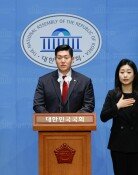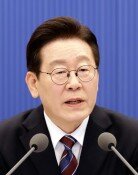Sovereign Expected to Make Around One Trillion Won from Sale of SK Stake and Dividend
Sovereign Expected to Make Around One Trillion Won from Sale of SK Stake and Dividend
Posted July. 18, 2005 03:09,
It was reported that Sovereign Asset Management, a British fund which had attempted to take part in the management of SK Corporation, plans sell all its shares in the Korean company to foreign investment firms.
This means the disputes between SK Corp. Chairman Chey Tae-won and Sovereign over SKs management rights, which began in April 2003, will in effect come to a close after two and a quarter years.
By disposing of its shares, Sovereign is expected to gain some one trillion won in profit.
Sovereign Will Sell SK Stake Soon-
SK Group and the securities industry reported on July 17 that Sovereign Asset Management decided to sell all 19,028,000 shares of its stock in SK Corp.14.82 percent of total SK sharesand recently reached an agreement with British and Hong Kong investment companies.
An official from SK Group said, It was confirmed that Sovereign finished negotiations with foreign investors regarding selling its SK stocks around July 15, adding, It has not been verified who would be acquiring the shares.
Details on the stock sale are expected to be clarified after the Financial Supervisory Service (FSS) receives a Position Paper on Massive Possession of Stocks.
The securities industry reports that the biggest reason for Sovereigns sale is that it has already secured enough gains on valuation.
Since April 2003, Sovereign Asset Management had bought stocks in SK at an average price of 9,293 won per share. Subtracting the cost average (9,293 won) from the closing price on July 15 (52,700 won) and multiplying that figure by the number of shares the company owns, it turns out that Sovereigns total capital gains could reach about 825.9 billion won.
On top of that, when the dividends of 48.5 billion won in 2003 and 2004 and other gains from foreign exchange transactions are taken into account, its entire gain comes in at around one trillion won.
The companys failure to share management rights of SK is believed to be another factor for its decision to sell.
Last year, Sovereign recommended five board members candidates but was defeated in a vote at SKs general shareholders meeting. This year, it unsuccessfully opposed giving a vote of confidence to SK Chairman Chey.
Will SKs Management Rights be Secure?-
It seems that Sovereigns disposal of its SK stocks will make Chairman Cheys management rights secure for the moment.
For now, a large number of investors are expected to purchase Sovereigns shares in small quantities. Against this backdrop, it would be difficult for these possible stockholders to speak with one voice over management rights.
The fact that Chairman Chey was sentenced to suspended imprisonment, not actual jail time, on charges of illicit insider trading and book-cooking in a June 10 case is also considered to be an opportunity for him to strengthen his management rights within the firm.
Given that [SK Corp.] made its biggest gains last year, and that its foreign oil field development project is in full swing, Chairman Cheys grip on [SKs] management rights will become stronger, said an official from SK Corp.
He went on to add, We are also keeping an eye on the possibility that some of the investors in SKs shares might try to intervene in management rights the way Sovereign did.
Sovereign Asset Management owns 7.0 percent and 7.2 percent of LG Corporation and LG Electronics, respectively. This is why it is a matter of concern whether Sovereign will purchase extra LG Group stocks with the money it secures by selling SK Corp. shares, or whether it disposes of its stocks in LG as well.
What Sovereign Leaves Behind-
The SK-Sovereign disputes over management rights betrayed the reality of a vague preference for foreign investment and lax domestic laws and regulations.
Above all, the argument has gained momentum that adverse effects from foreign investment and the governments market supervisory functions, including the Foreign Investment Promotion Act, should be reconsidered. Enterprises are demanding that limits on financial affiliates voting rights and equity-holding be lifted in an endeavor to protect their management rights.
Some believe it is quite encouraging, however, that management rights disputes have catalyzed an improvement in the weak governance structures that regulate big business.
Ever since Sovereigns bid to contest corporate management rights, SK Corp. has made significant progress by establishing a corporate governance structure centered on its Board of Directors. For Chairman Chey, [the threat] has also served as an opportunity to improve himself as a manager, said Professor Kim Woo-chan of the KDI School of Public Policy and Management.
He should keep in mind that the reason why SK Corp. saw its stock price jump by four times is that since the Sovereign Crisis, it has pushed ahead with improvements in its corporate governance structure, added Kim.
Ki-Jeong Ko koh@donga.com ssoo@donga.com




![‘노인 냄새’ 씻으면 없어질까?…“목욕보다 식단이 더 중요”[노화설계]](https://dimg.donga.com/c/138/175/90/1/wps/NEWS/IMAGE/2026/02/27/133434557.3.jpg)


